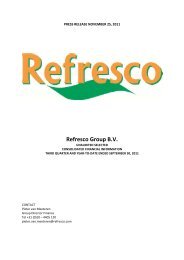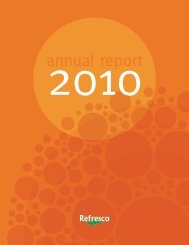You also want an ePaper? Increase the reach of your titles
YUMPU automatically turns print PDFs into web optimized ePapers that Google loves.
Market review 2009<br />
battle or balance? Developments in private<br />
labels and A-brand<br />
The economic downturn, beginning with the mid-2008 credit crunch, has led the world into a recession. The changed<br />
economic situation has caused a change in consumer behavior towards products with a lower value proposition, where<br />
private label products can fill the gap. In Europe, in the non-alcoholic beverages category the private label share accounts<br />
for 25.8% of the market. A-brands started to feel some pressure, but sound and strong brands have recovered or are<br />
<strong>de</strong>termined to recover their market position in the near future. B- and C- brands notice a significant drop in volume.<br />
In this section views, perspectives and comments on the<br />
<strong>de</strong>velopments in private labels and A-brands are given by food<br />
experts and major captains of industry from retail and A-brand<br />
companies.<br />
We spoke to Jan-Willem Grievink, general director of<br />
FoodService Institute The Netherlands Food, who specializes<br />
in international food chain issues and Koen <strong>de</strong> Jong, Managing<br />
Partner at IPLC (International Private Label Consult). Also<br />
interviewed were two food analysts from Rabobank: Sebastiaan<br />
Schreijen, Associate Director Processed Food & Retail and<br />
Francois Sonneville, Industry Analyst Beverage Sector. They<br />
<strong>de</strong>scribe general <strong>de</strong>velopments in the retail food market.<br />
Where did private label first emerge?<br />
According to tradition, the emergence of private labels already<br />
started at the beginning of the twentieth century when a<br />
number of retailers took up producing their own products to be<br />
less <strong>de</strong>pen<strong>de</strong>nt on brand manufacturers. Sebastiaan Schreijen<br />
comments: “Striking is that many established ol<strong>de</strong>r retail<br />
companies started as a milkman or a butcher’s shop at the<br />
beginning of the twentieth century and ad<strong>de</strong>d groceries<br />
to their fresh portfolio to become supermarkets in the<br />
1950s. In essence you can say they started as private<br />
label companies.” Jan-Willem Grievink adds: “The larger<br />
emergence of private labels took place in the fifties.<br />
The general driving forces were pretty much the same<br />
throughout Europe, and every country translated this into its<br />
own cultural context. There are two front-running countries<br />
in Europe: Switzerland and the UK. In Switzerland, in the late<br />
forties, the first private labels were born from a more ethical<br />
angle, when Gottlieb Duttweiler, foun<strong>de</strong>r of the Migros retail<br />
chain in 1925 and socially engaged entrepreneur, argued that all<br />
consumers should have access to products against fair prices.<br />
He believed that products should be much cheaper when<br />
marketing and advertising costs were<br />
stripped.







